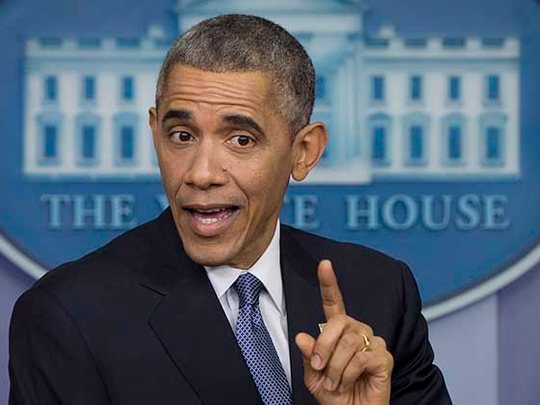
Manama: A prominent Kuwaiti columnist has assessed President Barack Obama’s end-of-the-year press conference as a disappointment after it stayed clearly away from the war on the terrorist group Daesh and other developments in the region.
Obama on December 19 held his final press conference of the year at the White House and answered eight questions from eight female reporters.
“The US President talked about the hacking of Sony, Cuba and the domestic situation in the US,” Saad Bin Teflah said.
“However, flagrantly missing were topics such as relations with Russia, Ukraine, oil prices, Palestine and other issues. The most outstanding topic that neither Obama nor the journalists at the conference mentioned was the war on Daesh. Here we have the president of the world’s largest country leading a coalition of countries against a terrorist group guilty of committing atrocities. The campaign was launched months ago and it was still going on when Obama held the press conference, yet he dodged the topic of a war led by his own country and expected, as his generals said, to last between three and ten years,” Ben Teflah, a former information minister, said.
The omission of the anti-Daesh topic can be attributed to two major reasons, he added in an opinion piece “No Questions About Daesh?” published by Kuwaiti news site Al Aan.
“They may see it as a non-significant war and this would be totally against any logic or common sense. There is no war that is insignificant, especially that US officials have been talking about the danger of Daesh and the need to eliminate it,” Bin Teflah said.
“The other explanation could be that there is no genuine war against terrorism, but rather a Western military plan to ensure their presence in the hot areas in order to manage crises and not to settle or end them,” he said.
Bin Teflah added that Obama had a strong tendency to keep the status-quo in any situation while attempting to contain it.
“That was his strategy towards the Arab-Israeli conflict when he clashed with [Prime Minister Benjamin] Netanyahu. It was also his stance towards Russia when he had to confront [Russian President Vladimir] Putin. It was the same attitude towards Iran’s nuclear programme after the end of a deadline and the failure to reach an agreement. He adopted the same attitude with North Korea after he pledged to ‘respond proportionally, and in a place and time that we choose’, the same expression used by [Syrian President] Bashar Al Assad every time Israel conducts a raid on Syrian targets,” Bin Teflah said.












